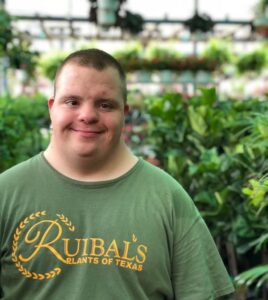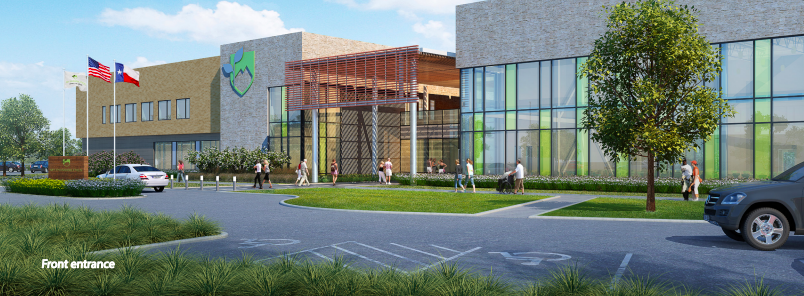Why would you have a hospital on a ship? And if you have one, why not two?…
Nonprofits Aimed at Independence for Those with IDD
July 26 is Americans with Disabilities Act Awareness Day
30 years ago, in 1990 the Americans with Disabilities Act (ADA) became law. This civil rights law established a series of anti-discrimination policies to protect individuals with disabilities in all areas of public life, including jobs, schools, transportation, and all places open to the general public. The purpose of the ADA was to ensure that individuals with disabilities are afforded the same rights and opportunities as everyone else.
The Foundation also approaches grant making in the disabilities spaces with a focus on opportunity for those with intellectual and developmental disabilities (IDD). Programs that The Foundation funds include therapeutic and enrichment opportunities for youth and young adults. With the right supports, many young adults with IDD can reach levels of self-sufficiency that include the ability to experience financial freedom, to own a home, to find a career they are passionate about, and to make friends.
The Foundation supports a number of nonprofits in North Texas that are empowering individuals with IDD by providing them with opportunities to build skills and become independent. Through vocational training, career assistance, higher learning, and housing, the following nonprofits, in additional to others, are improving the quality of life of North Texans with IDD and enriching the community through inclusion practices.
Best Buddies – Employment Opportunities
The Best Buddies Jobs Program represents Integrated Employment, one of the organization’s four key mission pillars. This program empowers people with IDD to secure employment, earn an income, pay taxes, and continuously and independently support themselves.
The Jobs Program places focus beyond the typical jobs in which a person with IDD might be placed. Best Buddies focuses on finding work that matches the job seeker’s interests and talents. That includes matching skilled and qualified individuals with IDD with businesses seeking enthusiastic and dedicated employees. Through the Jobs Program, Best Buddies develops partnerships with integrated community employers, assists with the hiring process and provides ongoing support to the employee and employer.
Individuals with IDD have an employment rate of 40 percent in Texas, according to Cornell University. This compares to an overall labor force participation rate in Texas of 64 percent, according to the Texas Workforce Commission. Policies and prejudices based on the false premise that people with IDD cannot work and must rely on others for support keep them in a life of perpetual poverty, over-reliant on facility-based employment and dependent on family or government benefits to meet their basic needs.
The Best Buddies Jobs Program has participants employed full time who each have the potential to earn a total income upwards of $1M over 30 years and contribute $250,000 in taxes back into the economy, rather than spending approximately $750,000 each in Federal SSI and Medicaid support during that time period.
The Best Buddies Job Program is available in select cities across the nation including Dallas and Houston. Through their partnerships, Best Buddies has placed individuals in paying jobs across several major industries at places such as Amazon, Richardson ISD, Bank of America, Chick-Fil-A, Coffee Bean, H-E-B, Kroger, Starbucks, Trader Joe’s, Chevron, YMCA, Varidesk, La Quinta, Pfizer, Lowe’s, Target, UPS, Fed-Ex, and many, many more. See the list of companies here: https://www.bestbuddies.org/jobs/participating-employers/
Best Buddies Jobs had a total of 1,472 active participants as of June of 2019. Participants made an average hourly wage $12.56, whilst working an average of 20 hours per week. The overall retention rate was 93 percent with individuals holding positions in 26 different industries.
The Jobs Program launched in Dallas in 2017 with 24 individuals employed at Albertson’s/Tom Thumb, Cold Stone Creamery, Blue Cross Blue Shield, and Silicon Valley Bank. The program continues to add new corporate partnerships creating more job opportunities for individuals with IDD.
To learn more about Best Buddies, please visit their website: https://www.bestbuddies.org/
Notre Dame School Dallas – Vocational Training
The Notre Dame School is devoted to serving students ages six to 21 with IDD in Dallas. The school’s individualized curriculum ensures that each child’s needs are met in a caring and appropriate way.
NDS developed a great deal of its own curriculum, incorporating technology and adapting math and reading programs from traditional curriculum to meet the needs of its students with intellectual disabilities. The school begins vocational training and transition planning early on when students reach age 15 and continues through graduation.

Notre Dame School student employed at Ruibal’s Plants through the school’s vocational training program (Photo Credit: NDS Facebook).
In the upper school, students learn about the various career opportunities available to them as well as the essential skills they will use in future job opportunities. Students ages 18-21 apply the skills they’ve learned in vocational training by working off-campus for the first half of the school day in both paid and unpaid internships. The school transports students to work each day and staff members serve as job coaches. The goal of the program is to enable the students to have a more independent future as they transition into the workforce.
The vocational training program feeds into the school’s formalized post-graduate job placement program. In a student’s final year at NDS, he or she is placed in a job that can continue after graduation. There are over 20 different job sites around Dallas that students can match with based on his or her skills, including Scottish Rite Hospital, Ruibal’s Plants, Locke Lord LLP, Dean Foods Corporate Office, RoRo’s Bakery, SPCA, Frontiers of Flight Museum, Trader Joe’s, and Monticello Nursing Home. See the list of companies here: https://www.notredameschool.org/academics-admissions/job-sites/
Families are also involved while their children are enrolled at NDS. The school engages families by teaching them about Metrocare Services, and guides them through applying for Social Security Disability Benefits as well as other public assistance programs.
To learn more about Notre Dame School, please visit their website: https://www.notredameschool.org/
My Possibilities – Vocational Training
My Possibilities formed in 2007 after three mothers joined forces over the lack of options for their children with IDD who were about to age out of high school. These students had the desire and potential to continue learning and improving their skills. What they lacked was the opportunity to do so.
Determined to create a better future for their own children and for others facing the same predicament, they designed a program that encouraged adults with IDD to learn, grow, volunteer, work and explore their talent while becoming contributing members of the community.
The My Possibilities Vocational Program helps refine skills needed to find employment, build stamina, and reiterate the work expectations required to retain a paid position in the community. After completing the vocational program, students graduate to the My Possibilities Campus for Higher Learning where they explore job opportunities and career paths.
In January of 2018, My Possibilities merged with LaunchAbility, the leading supported employment and job placement for adults with IDD, thus creating the LaunchAbility Career Center. The LaunchAbility Career Center is where My Possibilities offers one-on-one employment consultation. Through a partnership with the Texas Workforce Commission, students can find an integrated community employment position that pays at or above minimum wage.

Rendering of the My Possibilities Campus for Higher Learning (Photo Credit: My Possibilities Campus Booklet).
The LaunchAbility Career Center is housed in the newly constructed Campus for Higher Learning, the first ever college-style campus designed specifically for adults with disabilities. The 40,000-square-foot facility located on 20 acres in Plano serves 650 adults with IDD each week. Along with expanding its current programs, My Possibilities has been able to provide residential training and on-campus dorm experiences, broaden services that target behavior management skills, integrate physical and occupational therapy, educate the community on benefits of hiring individuals with IDD, and increase the number of individuals with IDD living independently.
To learn more about My Possibilities, please visit their website: https://mypossibilities.org/
Association for Independent Living – Vocational Training & Housing
Association for Independent Living (AFIL) is a unique and innovative residential program located in Dallas. It provides a transitional, residential program tailored to meet the needs of each individual. Its goal is to help young adults develop life skills so that they can live independently and become contributing citizens.
AFIL discovered that one of the greatest barriers for young adults with IDD in acquiring and maintaining housing is having a job. For that reason, AFIL helps individuals with IDD attain a job they’re excited about and secure housing, all while building the necessary skills to live independently.
Through a three-tier approach, AFIL moves students through a housing program toward the final goal of homeownership. This unique approach turns education and skill development into job security, which leads to a lifestyle of independence.
Level 1 consists of 24-hour supervision in a group residential home where residents share a bedroom and bathroom. These students are taught basic daily living skills such as nutrition, cooking, cleaning, laundry, health and fitness, as well as financial literacy, and the essentials for building healthy relationships. Students also begin vocational training where they learn how to build a resume and apply for employment, receive interview coaching, appropriate work attire and transportation.
Graduating to Level 2 earns students a higher level of independence. Students move into one-bedroom/one-bathroom apartments located across a small courtyard from the Level 1 dormitories. The apartment complex is staffed with a resident employee who monitors student activities and provides assistance with banking, overseeing weekly menus and grocery shipping, and facilitating social activities. The staff supervisor meets with each student individually to set goals and monitor progress. At Level 2, students are responsible for preparing their own menu, grocery shopping, cooking, cleaning, and other life skills required for independent living.
When students reach Level 3, they move into a small apartment complex next door to the AFIL campus. Each week they meet with their supervisor who helps them fine tune their skills, review their finances, and problem solve. At this level the supervisor encourages daily independence and only intervenes when necessary. Students are able to demonstrate many skills, including getting themselves up and ready for their day at work without any prompting or assistance.
Opportunities for homeownership also arise in Level 3, made possible by a student’s dedication to steady employment and financial literacy. In Level 3, the next phase of independent living, students are able to move to one of the neighboring 28 condos for purchase where a lower level of supervision is provided. Some students continue to live in the apartment complex, while others move into community-based apartments offsite. The final phase of the student’s living arrangement is contingent upon their personal level of independence and choice.
Because AFIL believes that independence requires employment, the goals for their students are to hold a job in a competitive employment position, pay their own fees at AFIL, and travel to their jobs using public or private transportation. The ultimate goal is for students to earn enough to cover their monthly rent and personal expenses.
To learn more about the Association for Independent Living, please visit their website: http://afildfw.org/
The Rees-Jones Foundation is a proud supporter of the nonprofit organizations listed above that support vocational training and independent living for individuals with IDD. Learn more about the nonprofit organizations that The Rees-Jones Foundation supports by visiting https://www.rees-jonesfoundation.org/our-grants
Share this post:
Category: Original Content
Power of Place-Based Investments Can Lead to Better Outcomes for Children By Trey Hill, Senior Program Officer…
Why Home Mentoring is Key to Child Abuse Prevention By Ona Foster, CEO of Family Compass [In…


